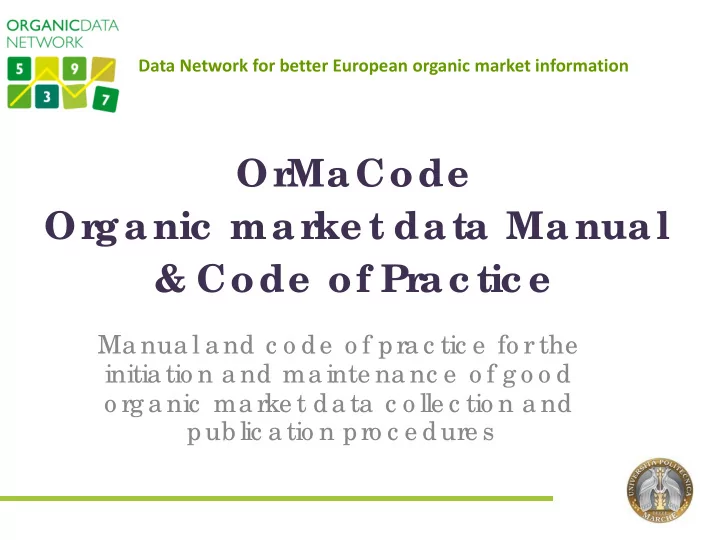

Data Network for better European organic market information Or MaCode Or ganic mar ke t data Manual & Code of Pr ac tic e Ma nua l a nd c o de o f pra c tic e fo r the initia tio n a nd ma inte na nc e o f g o o d o rg a nic ma rke t da ta c o lle c tio n a nd pub lic a tio n pro c e dure s
Objectives The OrMaCode is a toolkit intended to help facilitating further progress in the field of organic market data development, production and dissemination in Europe. The OrMaCode represents a fundamental tool to help establish a long-term partnership among the interested stakeholders Target: national statistical institutes all other stakeholders involved in data development, production, and dissemination 2
T he Code of Pra c tic e (OrMa Code ) a nd the ma nua l PART A: Imple me ntation of PART B: Code of Pr ac tic e an or ganic mar ke t (Or MaCode ) data c olle c tion syste m PART C: PART D: How to e stablish Description of data and imple me nt an collection methods or ganic mar ke t and methodological data c olle c tion background syste m (Manual)
OrMaCode 4
Data Network for better European organic market information A. Implementation of an organic market data collection system 5
Why do we need good data on the organic market Policy makers, farmers and companies need good quality data for decision making Data availability and quality is still far from optimal Lack of data and incomplete data Lack of common definitions and classification/aggregation rules across countries
Lack of common definitions Example: Livestock data Expected data is “head count”, which is interpreted as “average stock”, “number of places” (in stables), or “animals slaughtered”. Currently a country-to-country comparison for livestock is not possible
Lack of common classifications Almost every country uses different nomenclatures and classifications; only few use international classifications Example: Denmark uses the UN’s Standard International Trade Classification (SITC) The Czech republic the CPA codes (Eurostat) In countries, where the domestic market data are collected from panel data, usually the nomenclature and classifications of the major market research companies are used.
Data Network for better European organic market information B. The Code of Practice 11
OrMaCode 12
The Code of Practice If an organisation wants to collate and publish organic market data, it is very important that this should be done according to precise standards of good practice. The Code of Practice is organised according to the same three sections of the European Statistics Code of Practice, and considers itself an extension to that specifically aimed at providing guidance and support to organic market statistical information providers. 13
Institutional Environment Principle 1 (Professional Independence) Principle 2 (Mandate for data collection) Principle 3 (Adequacy of Resources) Principle 4 (Commitment to Quality) Principle 5 (Statistical Confidentiality) Principle 6 (Impartiality and Objectivity)
Statistical Processes Principle 7 (Sound Methodology) Principle 8 (Appropriate Statistical Procedures) Principle 9 (Non excessive burden on respondents) Principle 10 (Cost effectiveness) 15
Statistical Output Principle 11 (Relevance) Principle 12 (Accuracy and Reliability) Principle 13 (Timeliness and Punctuality) Principle 14 (Coherence and Comparability) Principle 15 (Accessibility and Clarity) 16
Institutional Environment Principle 1 (Professional Independence): To ensure professional independence and integrity where bodies closely aligned with the organic sector are involved in data collection, there should be a clear structural division within the lead data production body between the unit or department collating and publishing the data and any business or policy oriented department. Indicators : ethics statements statistical releases should be clearly distinguished and issued separately from policy statements 17
Statistical Processes Principle 7 (Sound Methodology): Sound statistical methods are a vital contributory factor when it comes to organic market data quality. The OrganicDataNetwork promotes a higher degree of harmonisation of procedures, classifications and definitions among all member organisations. Indicators : use the standard Classification of Products by Activity (CPA). Professional development of data collectors. 19
Statistical Output Principle 12 (Statistical Output): To ensure accuracy and reliability, all organic market data should be validated by means of consistency checks and periodic reviews. As far as commercial confidentiality allows, all data should be reviewed by at least one independent individual who is not directly employed by the people or lead organisation collecting and processing the data. Indicators : standardised consistency checks should be carried out on the data . periodical independent statistical audits. 21
Recommend
More recommend